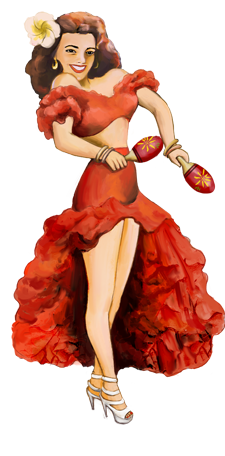

“Empanadas” (turnovers) are a big tradition in my family. My mother learned how to make them with my paternal grandmother’s home recipe, and all that side of the family uses the same recipe. I usually call them “Pinareno empanadas”, since that part of my family comes from Pinar del Rio, the most western area of Cuba, where the best tobacco in the world is grown. There is no family celebration or important family gathering without empanadas, not to mention that they have become an essential part of Christmas Eve and New Year’s Eve dishes every year.
I remember how my mother made them with a rolling pin that was a family heirloom. She stuffed them with ground beef or guava. I remember her using the leftover dough she made by hand. She cut 1 -1 ½ inch strips and fried them. When they were really crispy, she sprinkled them with sugar and told me they were “chiviricos”, Cuban-style flat churros, and I would eat them while I hunched over the ceramic surface of the stove where she was cooking them. That smell of freshly made dough – as well as the atmosphere you felt in the house while she was frying them – is an unforgettable remembrance for me, something that Cuba Libre’s empanadas brought back to memory. Watching how something so characteristic of Cuba, so deeply rooted in our family traditions for generations, is made in such a remote location, is like going back to the family parties; it is part of the magic that Cuba Libre’s cuisine inspires in a Cuban like me.
Stuffed potatoes also have great acceptance in Cuba; they are very famous and popular among the islanders. In Cuba, they are usually made in different sizes, but mostly big; those are the home-made ones. Eating two stuffed potatoes is a whole dinner, since their size will totally fill you up and it suits the taste of many Cubans for a hearty meal. I remember that my mother (and I mention her again since she was my first cooking teacher) told me that you need to put a little love in food, she never cooked without it. She didn’t like big stuffed potatoes. She said you couldn’t really enjoy the stuffing, and that it was hard to heat them all the way through without burning them or keeping their shape. That was one lesson she learned by experience. She also liked to stuff them with cheese and ground beef, and tasting the delicacies she made was priceless. Cuba Libre brings back those “culinary childhood memories” every day, and I am pleased to be part of a team who makes stuffed potatoes very similar to the ones I describe. In this part of America, stuffed potato is a dish not unknown to any Cuban. Obviously, the detailed presentation of Cuba Libre’s stuffed potato shows what is being done in a professional kitchen, but this is one of the aspects that impresses me the most; the simplest dish can be an ambassador of a small country in a different culture while maintaining its Cuban essence.
Havana’s Chinatown has a great history and culinary charm. It is located near the National Capitol between Amistad and Dragones streets. The first Chinese restaurant in Cuba is said to date back to 1874 approximately. It was located on Dragones Street # 40. They made San Francisco-style “Chinese” food, very distant from the original Asian food, but adapted to the Cuban taste – so much, that even nowadays Chinatown is very popular and has become part of the Cuban culinary heritage – from Chinese soup to spring rolls, a wide range of dishes that Cubans love. What a surprise it was for me to be able to taste and make spring rolls in Cuba Libre, and very Cuban-style, which is one of the strongest appeals. I am personally and professionally amazed at how Cuba Libre recreates even that aspect of our culinary culture. When I hold in my hand a Cuba Libre spring roll and feel its crispy texture on the outside mixed with its soft stuffing, and then raise my sight and look around the restaurant and see all the ornamentation, it is worth saying, “I am in Dragones Street in Havana, I am in Chinatown”.
((Check back here next week for Angel's third blog about how Cuba Libre honors Cuban culinary traditions through its tapas, entrees, desserts...and rum))


